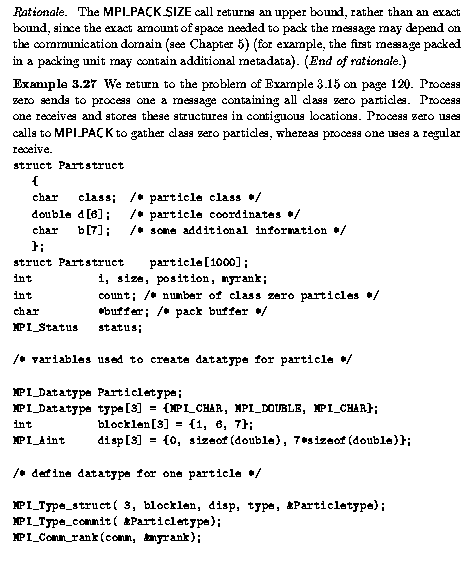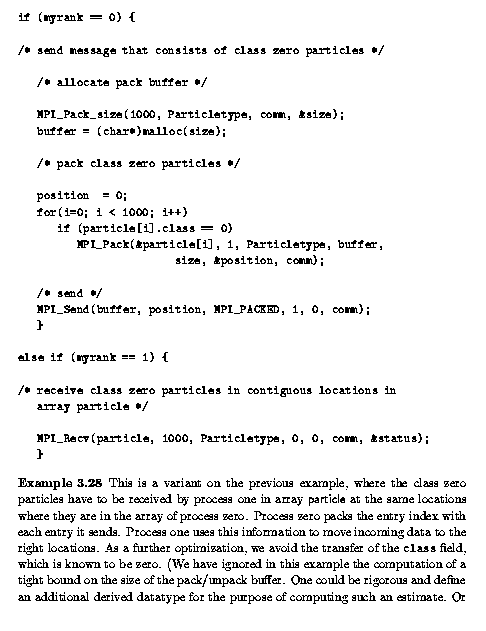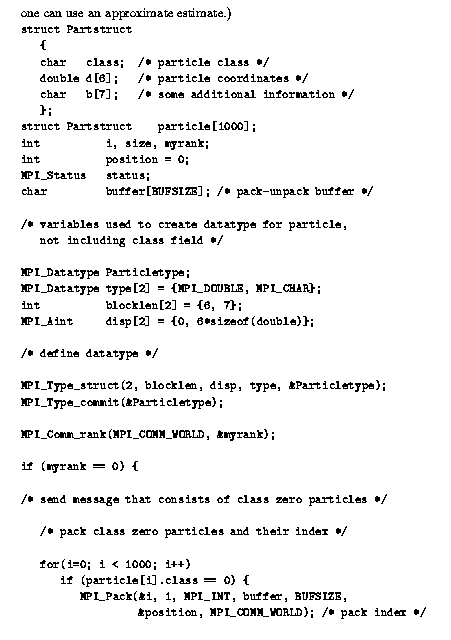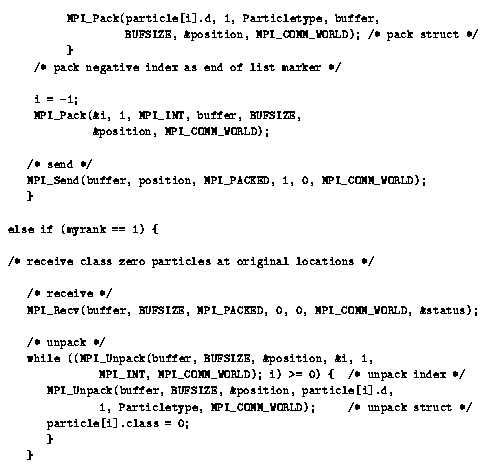
Some existing communication libraries, such as PVM and Parmacs, provide pack and unpack functions for sending noncontiguous data. In packunpack these, the application explicitly packs data into a contiguous buffer before sending it, and unpacks it from a contiguous buffer after receiving it. Derived datatypes, described in the previous sections of this chapter, allow one, in most cases, to avoid explicit packing and unpacking. The application specifies the layout of the data to be sent or received, and MPI directly accesses a noncontiguous buffer when derived datatypes are used. The pack/unpack routines are provided for compatibility with previous libraries. Also, they provide some functionality that is not otherwise available in MPI. For instance, a message can be received in several parts, where the receive operation done on a later part may depend on the content of a former part. Another use is that the availability of pack and unpack operations facilitates the development of additional communication libraries layered on top of MPI. layering
MPI_PACK(inbuf, incount, datatype, outbuf, outsize, position, comm)
IN inbuf input buffer
IN incount number of input components
IN datatype datatype of each input component
OUT outbuf output buffer
IN outsize output buffer size, in bytes
INOUT position current position in buffer,in bytes
IN comm communicator for packed message
MPI_Pack(void* inbuf, int incount, MPI_Datatype datatype, void *outbuf, int outsize, int *position, MPI_Comm comm)
MPI_PACK(INBUF, INCOUNT, DATATYPE, OUTBUF, OUTSIZE, POSITION, COMM, IERROR)<type> INBUF(*), OUTBUF(*)
INTEGER INCOUNT, DATATYPE, OUTSIZE, POSITION, COMM, IERROR
MPI_PACK packs a message specified by inbuf, incount, datatype, comm into the buffer space specified by outbuf and outsize. The input buffer can be any communication buffer allowed in MPI_SEND. The output buffer is a contiguous storage area containing outsize bytes, starting at the address outbuf.
The input value of position is the first position in the output buffer to be used for packing. The argument position is incremented by the size of the packed message so that it can be used as input to a subsequent call to MPI_PACK. The comm argument is the communicator that will be subsequently used for sending the packed message.
MPI_UNPACK(inbuf, insize, position, outbuf, outcount, datatype, comm)
IN inbuf input buffer
IN insize size of input in bytes
INOUT position current position in bytes
OUT outbuf output buffer
IN outcount number of components to be packed
IN datatype datatype of each input component
IN comm communicator for packed message
MPI_Unpack(void* inbuf, int insize, int *position, void *outbuf, int outcount, MPI_Datatype datatype, MPI_Comm comm)
MPI_UNPACK(INBUF, INSIZE, POSITION, OUTBUF, OUTCOUNT, DATATYPE, COMM, IERROR)<type> INBUF(*), OUTBUF(*)
INTEGER INSIZE, POSITION, OUTCOUNT, DATATYPE, COMM, IERROR
MPI_UNPACK unpacks a message into the receive buffer specified by outbuf, outcount, datatype from the buffer space specified by inbuf and insize. The output buffer can be any communication buffer allowed in MPI_RECV. The input buffer is a contiguous storage area containing insize bytes, starting at address inbuf. The input value of position is the position in the input buffer where one wishes the unpacking to begin. The output value of position is incremented by the size of the packed message, so that it can be used as input to a subsequent call to MPI_UNPACK. The argument comm was the communicator used to receive the packed message.

The MPI_PACK/MPI_UNPACK calls relate to message passing as the sprintf/sscanf calls in C relate to file I/O, or internal Fortran files relate to external units. Basically, the MPI_PACK function allows one to ``send'' a message into a memory buffer; the MPI_UNPACK function allows one to ``receive'' a message from a memory buffer.
Several communication buffers can be successively packed into one packing unit. This packing unit is effected by several, successive related calls to MPI_PACK, where the first call provides position = 0, and each successive call inputs the value of position that was output by the previous call, and the same values for outbuf, outcount and comm. This packing unit now contains the equivalent information that would have been stored in a message by one send call with a send buffer that is the ``concatenation'' of the individual send buffers.
A packing unit must be sent using type MPI_PACKED. Any point-to-point MPI_PACKED or collective communication function can be used. The message sent is identical to the message that would be sent by a send operation with a datatype argument describing the concatenation of the send buffer(s) used in the Pack calls. The message can be received with any datatype that matches this send datatype.
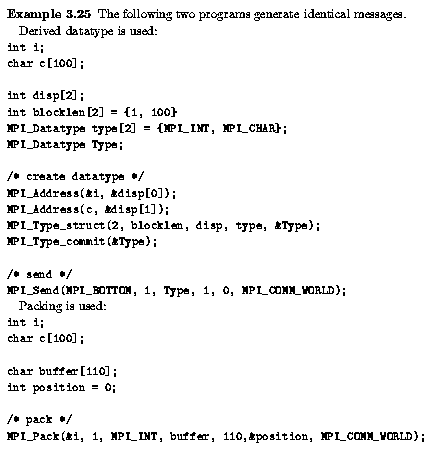
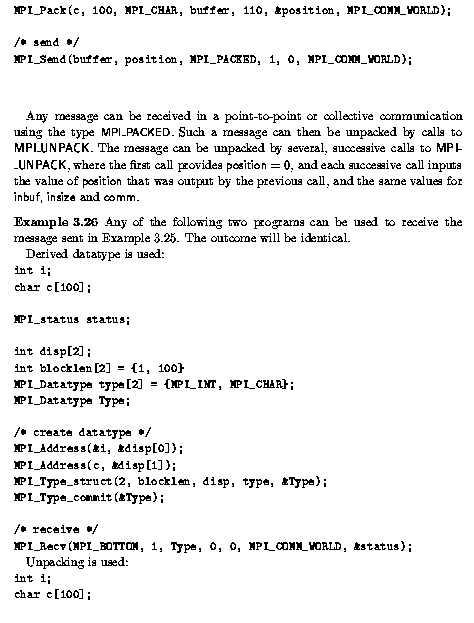
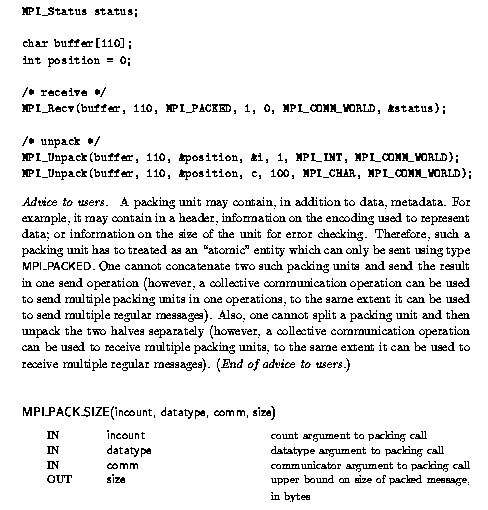
MPI_Pack_size(int incount, MPI_Datatype datatype, MPI_Comm comm, int *size)
MPI_PACK_SIZE(INCOUNT, DATATYPE, COMM, SIZE, IERROR)INTEGER INCOUNT, DATATYPE, COMM, SIZE, IERROR
MPI_PACK_SIZE allows the application to find out how much space is needed to pack a message and, thus, manage space allocation for buffers. The function returns, in size, an upper bound on the increment in position that would occur in a call to MPI_PACK with the same values for incount, datatype, and comm.
